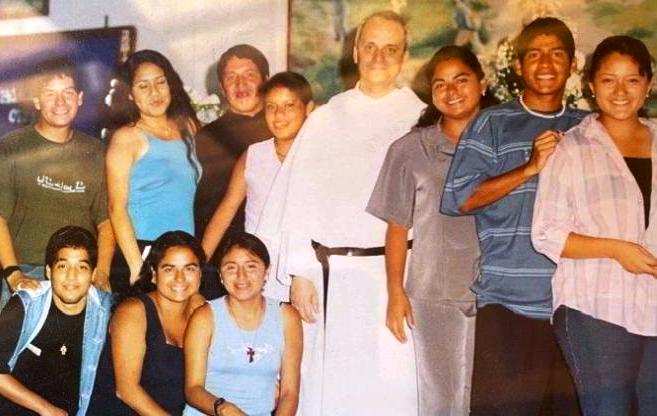Pope Leo and the Youth.

Welcoming, listening and guiding. Some characteristics of Pope Leo with the youth
During the years when Father Robert Francis Prevost was pastor of the church of Our Lady of Montserrat in Trujillo, Peru, his dedication to young people generated conversions and changes.
David, one of the young people of the parish, recalls: “I was able to experience his humility and his service up close, especially through the youth group called Jóvenes Amigos de Cristo, the Young Friends of Christ, which he strongly promoted. It was a period that marked my life and my faith in a definitive way”.
The future Leo XIV’s relationship with young people was marked above all by closeness, deep prayer, and his very special ability to welcome, listen, and guide. “His words were firm but warm – says Maria del Sol -. His way of preaching made us feel the presence of Christ among us. He was not just a priest but a true pastor. For us, he was a guide, a point of reference, and, over time, he became a true spiritual friend. “
What attracted the boys and girls of the parish of Monserrat to that Augustinian missionary with an ascetic and serene air was his ability to transform lives profoundly. David continues: “He truly believed in us. He gave us space, he understood us, and he encouraged us to take on responsibilities in the Church. He did not treat us as just another group but as the heart of a living Church. Thanks to him, many of us learned what it means to live in community, share the faith with joy, organise retreats and evangelise”.
David’s life took a truly unexpected turn: “It happened when, in the youth group created by Father Prevost, I met Cynthia, who is now my wife. We met by sharing faith, service, and prayer. What we experienced was so authentic that today we continue to walk in faith, educating our daughters with the same values that the parish priest sowed in us”.
But Father Prevost did not only cause a revolution in the hearts and lives of young people: under his direction, the entire parish became everyone’s home. Many pastoral groups were formed, their structures were decentralised to other areas of the city, and dozens and dozens of faith meetings and intense solidarity activities were promoted. Luisa says: “The parish stopped being just a temple and transformed into a lively, joyful and committed community. Prevost’s example reawakened in many a vocation towards the Church”.
For those young people who long ago became fathers and mothers of families, Leo XIV will always remain Father Robert, the pastor who taught them to live the Gospel to build up the Kingdom of God. “Prevost – concludes David – is not a man of power; he is a man of the Lord. He knows the challenges of small communities, he knows what it means to build from the bottom. His pastoral experience, his love for young people and his Augustinian spirit can give hope to a Church that needs to return to the essentials”.
After learning the news of the election of their old parish priest as Pope, many of those young people found themselves again. Elvira says: “I felt a mixture of amazement, gratitude and pride. It was impossible not to think of those days of youth, of the homilies, of his hugs, of his affectionate smile. I felt that the Holy Spirit had set his eyes on a true pastor. And I wasn’t the only one: many of those who knew him met again after many years, simply to pray for him and give thanks. We cried with emotion. We all felt that a part of our heart was there, in Rome”.
Pope Leo knows the world of young people very well, also because he was once a teacher. So, no one was surprised when exactly one week after his election to the Papal Throne, meeting the “Brothers of the Christian Schools” in the Clementine Hall, he said: “The young people of our time, like those of every era, are a volcano of life, energy, feelings, ideas. You can see it from the wonderful things they can do in many fields. However, they too need help to make so much wealth grow in harmony and to overcome what, even in a way unlike that of the past, can still impede their healthy development.”
“These are the obstacles we face today. Let’s think about the isolation that is caused by widespread relational models that are increasingly marked by superficiality, individualism and emotional instability; the spread of thought patterns weakened by relativism; the prevalence of rhythms and lifestyles in which there is no room to listen, reflect or dialogue, whether in the school, the family or even among peers themselves, with the loneliness that comes from it”.
“These are demanding challenges, but we too can make them springboards to explore ways, develop tools and adopt new languages, with which to continue to touch the hearts of students, helping them and encouraging them to face courageously every obstacle and give their best in life”, he concluded.
On Sunday, May 11, in the presence of one hundred thousand people in St. Peter’s Square, Pope Leo XIV focused on welcoming and accompanying young people for a call to priestly and religious life: “Young men and women must find a welcome in our communities, feel that they are listened to, are encouraged in their vocational journey, and that they can count on credible models of generous dedication to God and to their brothers and sisters. To young people I say: “Do not be afraid! Accept the invitation of the Church and of Christ the Lord!”
Francis Mutesa



